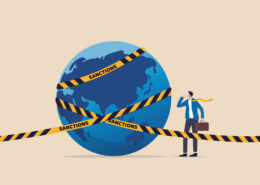Sanctions and Export Controls Update
Monthly Roundup – May 2025
📅 June 3, 2025
📅 June 3, 2025
Welcome to this month’s Sanctions and Export Controls Update, highlighting IFI’s take on key developments from May 2025.
The United States, EU, and UK advanced sanctions and export control measures targeting drug trafficking, geopolitical threats, and the war in Ukraine. The U.S. sanctioned Mexico’s CJNG cartel and issued broad Syria sanctions relief following President Trump’s announcement to lift restrictions post-Assad. The Commerce Department also scrapped the AI Diffusion Rule, opting for stricter chip export controls to counter China.
The EU adopted its 17th Russia sanctions package, extended cyber-attack measures, and lifted economic sanctions on Syria. It also sanctioned Russian actors involved in hybrid threats. The UK updated its export control list, issued new financial sanctions on Russia-linked entities, and introduced 100 additional designations targeting Russia’s military, energy, and propaganda networks.
May saw significant shifts in U.S. sanctions and export control priorities, including immediate relief for Syria following the Assad regime’s fall, and a reinforced export control approach to AI and semiconductors. Additionally, the United States sustained its aggressive posture against transnational criminal organizations with new designations tied to the CJNG cartel.
The Treasury Department imposed sanctions on three Mexican nationals, including CJNG leader César “Primito” Morfín Morfín, and two companies involved in fuel theft and fentanyl trafficking. The designations target CJNG’s diversification into crude oil smuggling, an increasingly lucrative revenue stream that finances cartel violence and narcotics trade. Concurrently, the Treasury Department’s FinCEN issued an alert for financial institutions outlining typologies and red flags to detect related illicit finance.
The Department of Commerce rescinded the Biden-era “AI Diffusion Rule,” citing risks to innovation and diplomacy. The Trump Administration unveiled plans for a replacement strategy focused on collaboration with allies and strengthened chip-related export controls to prevent Chinese access to advanced semiconductors. A new guidance advisory warns against the use of Chinese chips and outlines critical infrastructure protections.
President Trump announced a plan to lift U.S. sanctions on Syria, citing the fall of the Assad regime and the establishment of an interim government under Ahmed al-Sharaa. This policy shift was framed as a step toward normalization and reconstruction, following consultations with Türkiye and Saudi Arabia.
Following Trump’s announcement, OFAC issued General License 25 (GL 25), authorizing transactions across all sectors of the Syrian economy, provided they do not involve designated terrorist organizations. A new waiver under the Caesar Syria Civilian Protection Act has also been issued to allow foreign partners, allies, and the region to invest in Syria.
The EU intensified its sanctions strategy in May 2025, focusing on Russia’s hybrid threats and continued aggression in Ukraine. It adopted its 17th sanctions package targeting Russia’s shadow fleet, dual-use imports, and 75 new individuals and entities. In response to rising cyber threats, the EU extended its cyber sanctions regime and expanded listings for actors engaged in digital espionage and propaganda. The EU also lifted all remaining economic sanctions on Syria following the fall of the Assad regime, signaling support for reconstruction under new leadership. These actions reflect a broader effort to reinforce EU security and uphold international law.
The EU adopted its 17th sanctions package against Russia since its military invasion of Ukraine. This package targets Russia’s shadow fleet of oil tankers, adds 75 new individual and entity listings, and imposes stricter trade controls on military-use technologies. It also extends an oil price cap exemption for Japan’s energy security. The sanctions have significantly reduced Russia’s oil revenues and access to critical goods, with the EU stressing continued international coordination and efforts to prevent circumvention.
The EU also imposed new sanctions on 21 individuals and six entities involved in Russia’s destabilizing activities abroad, including media manipulation, espionage, cyberattacks, and propaganda. These measures expand the EU’s ability to target tangible assets and financial operations supporting such activities, and allow for suspending Russian media broadcasts within the EU. Key figures listed include pro-Russian propagandists, intelligence operatives, and companies engaged in surveillance and disinformation campaigns, particularly in Ukraine, the EU, and Africa.
On May 20, the EU lifted all remaining economic sanctions on Syria to support the country’s recovery following the fall of Bashar al-Assad’s regime, aligning with a similar move by the U.S. under Donald Trump. While aiming to encourage stability and inclusive governance under interim president Ahmed al-Sharaa, the EU warns sanctions could return if commitments are not upheld. Restrictions on arms, surveillance tools, and individuals tied to Assad remain in place.
The EU extended its sanctions against cyber-attacks threatening the Union and its member states until 18 May 2026, with the legal framework for these measures prolonged until 2028. These targeted sanctions, such as asset freezes and travel bans, apply to individuals and entities involved in significant cyber-attacks and aim to deter malicious cyber activity and uphold international norms. Currently affecting 17 individuals and four entities, the measures are part of the EU’s broader cyber diplomacy efforts and will be reviewed annually.
The UK advanced a robust sanctions agenda in May, including 100 new Russia-related designations targeting the drone supply chain, shadow fleet operations, and financial networks. The UK also updated its export control regulations to align with global regimes and introduced an “Open General Export Licence” to ease military exports to trusted allies. Financial sanctions were imposed on Russian-linked energy firms, while sanctions on five Zimbabwe-related targets were lifted in coordination with the U.S. and EU. Together, these steps reflect the UK’s dual strategy of tightening pressure on adversaries while signaling flexibility toward reengagement where reforms are underway.
The UK imposed financial sanctions, including asset freezes and trust service restrictions, on five individuals and four entities linked to Russia’s energy and financial sectors. The individuals, mainly Azerbaijani nationals, were directors of Coral Energy Group (now 2Rivers Group), BX Energy, and Nord Axis Ltd, which are companies involved in trading Russian oil and operating in sectors of strategic importance to the Russian government. The action, under the Russia (Sanctions) (EU Exit) Regulations 2019, supports the UK’s ongoing efforts to pressure Russia over its aggression toward Ukraine.
The UK also announced 100 new sanctions targeting Russia’s military, energy, financial sectors, and propaganda networks in response to Putin’s largest drone attack on Ukraine. These measures aim to disrupt weapons supply chains, oil revenues, and sanctions evasion networks, including shadow fleet operations and financial institutions. The UK is also working with partners to tighten the Oil Price Cap, further undermining Russia’s war economy and pressuring Putin to agree to an unconditional ceasefire.
The Export Control (Amendment) Regulations 2025, effective 20 May 2025, update the UK’s strategic export control list by amending the Export Control Order 2008 and the assimilated Dual-Use Regulation. Key changes include increasing fines for certain offences, updating military and dual-use goods lists to reflect technical changes agreed through multilateral regimes like the Wassenaar Arrangement, and aligning with updates from other international control groups such as the Australia Group and Nuclear Suppliers Group. These revisions aim to maintain consistency with global export control standards.
The UK Secretary of State has approved an “Open General Export Licence (OGEL)” allowing the export and re-export of certain military goods, software, and technology to specified low-risk destinations. Exporters must provide required documentation, maintain transaction records for audit purposes, and ensure shipments go only to authorized countries, NATO entities, contractors, and armed forces. The OGEL is designed to streamline exports while ensuring compliance with UK export controls.
The United Kingdom has removed five Zimbabwean individuals and one entity from its sanctions list, signaling a shift in its approach toward the country. Those delisted include Owen Ncube, Midlands provincial affairs minister; Anselem Sanyatwe, sports minister; Isaac Moyo, director-general of the Central Intelligence Organisation; Godwin Matanga, former police commissioner-general; and Zimbabwe Defence Industries (ZDI), the state-owned arms manufacturer. This development follows the European Union’s decision in February to lift sanctions on ZDI while renewing its broader Zimbabwe sanctions framework. Similarly, the United States eased its stance in March 2024 by removing several Zimbabwe-related designations.










 The Network, Not the Node
The Network, Not the NodeThis site uses cookies. By continuing to browse the site, you are agreeing to our use of cookies.
Accept settingsHide notification onlySettingsWe may request cookies to be set on your device. We use cookies to let us know when you visit our websites, how you interact with us, to enrich your user experience, and to customize your relationship with our website.
Click on the different category headings to find out more. You can also change some of your preferences. Note that blocking some types of cookies may impact your experience on our websites and the services we are able to offer.
These cookies are strictly necessary to provide you with services available through our website and to use some of its features.
Because these cookies are strictly necessary to deliver the website, refusing them will have impact how our site functions. You always can block or delete cookies by changing your browser settings and force blocking all cookies on this website. But this will always prompt you to accept/refuse cookies when revisiting our site.
We fully respect if you want to refuse cookies but to avoid asking you again and again kindly allow us to store a cookie for that. You are free to opt out any time or opt in for other cookies to get a better experience. If you refuse cookies we will remove all set cookies in our domain.
We provide you with a list of stored cookies on your computer in our domain so you can check what we stored. Due to security reasons we are not able to show or modify cookies from other domains. You can check these in your browser security settings.
These cookies collect information that is used either in aggregate form to help us understand how our website is being used or how effective our marketing campaigns are, or to help us customize our website and application for you in order to enhance your experience.
If you do not want that we track your visit to our site you can disable tracking in your browser here:
We also use different external services like Google Webfonts, Google Maps, and external Video providers. Since these providers may collect personal data like your IP address we allow you to block them here. Please be aware that this might heavily reduce the functionality and appearance of our site. Changes will take effect once you reload the page.
Google Webfont Settings:
Google Map Settings:
Google reCaptcha Settings:
Vimeo and Youtube video embeds:
You can read about our cookies and privacy settings in detail on our Privacy Policy Page.
Privacy Policy